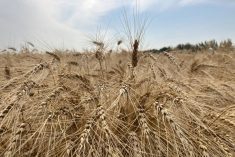Chicago | Reuters — U.S. corn, soybeans and wheat futures rose on Monday in response to worries about potentially stressful hot weather in the Midwest and Europe, coupled with bullish sentiment in crude oil and a weaker dollar, analysts said.
Chicago Board of Trade benchmark December corn settled up seven cents at $6.10-3/4 per bushel, after reaching $6.23-3/4, its highest since July 12 (all figures US$).
CBOT November soybeans ended up 38 cents at $13.80-1/4 a bushel, and Chicago September wheat finished up 36 cents at $8.12-3/4.
Read Also

U.S. livestock: Feeder cattle hit contract highs on tight supply
Chicago | Reuters – All Chicago Mercantile Exchange feeder cattle futures and most live cattle futures hit contract highs on…
“Energies are higher, the dollar is lower, metals are higher. So you have a commodity-friendly market today, and respect for some heat coming at us,” said Don Roose, president of Iowa-based U.S. Commodities.
Corn and soybean futures sometimes follow trends in crude oil due to their respective roles as feedstocks for ethanol and biodiesel fuel.
Weather was in the spotlight as the U.S. corn crop continued to pollinate, a key phase for determining yields. Weekend rains boosted crops in the eastern Midwest, but dryness persists in western areas as forecasts called for rising temperatures.
“Hotter and drier weather is expected across the Corn Belt this week, which will increase dryness in the western Corn Belt and lead to some crop stress,” space technology company Maxar said in a daily weather note.
After the CBOT close, the U.S. Department of Agriculture rated 64 per cent of the U.S. corn crop in good to excellent condition, unchanged from the previous week. Analysts surveyed by Reuters on average had expected a decline of one percentage point.
For soybeans, USDA rated 61 per cent of the crop as good to excellent, down from 62 per cent the previous week, while analysts on average had expected no change.
CBOT wheat futures jumped 4.6 per cent, fueled by bargain buying after the September contract tumbled nearly 13 per cent last week, the biggest plunge on a continuous chart of the most-active contract since March 2011.
Traders continued to monitor talks among Russia, Ukraine, Turkey and the United Nations about resuming Ukraine’s Black Sea grain exports. Negotiators will most likely meet this week, Ankara said, while a Turkish official said lingering “small problems” should be overcome.
— Reporting for Reuters by Julie Ingwersen in Chicago; additinoal rpeorting by Michael Hogan in Hamburg and Naveen Thukral in Singapore.
















